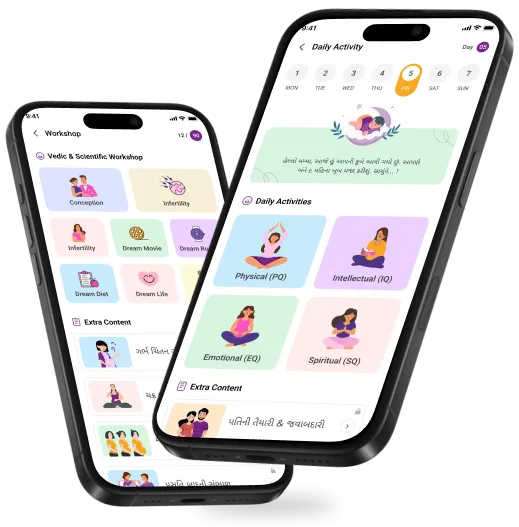Hey there, beautiful moms and mom-to-be!
Pregnancy is a time of significant changes, both physically and emotionally. One common concern for many expecting mothers is how to maintain a healthy weight while ensuring they and their baby get the essential nutrients they need. It's all about finding the right balance and making smart choices when it comes to food.
First things first, let's talk about healthy weight gain during pregnancy. While it's normal to put on some extra kgs to support your baby's growth and development, gaining too much or too little weight can have complications for both you and your little one. That's why it's important to focus on healthy weight gain.
Imagine this: You're starting on the amazing journey of pregnancy, filled with hope and joy. As you take care of the precious life growing inside you, it's natural to wonder about managing your weight and diet during this special time. Don't worry, because we're here to guide you through it all!
Weight Gain During Pregnancy

Weight gain during pregnancy is normal and necessary for the development of your baby and your body's changes. The weight gain includes not only your baby's growth but also additional tissues like breast enlargement, the uterus, placenta, extra fluid, and blood.
Think of your body as a temple/home, and the food you eat as the building blocks for your baby's development. By choosing nutrient-rich foods, you're laying a strong foundation for your baby's future health. Visualize a colorful plate filled with a variety of fruits, vegetables, whole grains, lean proteins, and healthy fats. These foods provide essential vitamins, minerals, and antioxidants that support your baby's growth and help you maintain a healthy weight.
This weight gain is necessary to support the healthy development of your baby and prepare your body for the demands of childbirth and breastfeeding. While the exact amount of weight gained can vary from woman to woman and pregnancy to pregnancy, it's generally recommended for women of normal weight before pregnancy to aim for a total weight gain of around 11 to 13 kilograms. This gradual and steady increase in weight is a sign of your body's incredible ability to nurture and sustain new life, and it's an important aspect of the beautiful journey of pregnancy.
Daily Calorie Intake During Pregnancy

Consuming a calorie-rich diet during pregnancy is essential for both the mother and the baby to gain healthy and necessary weight. The recommended additional daily calorie intake varies based on the trimester of pregnancy, with the second trimester requiring around 340 extra calories per day and the third trimester needing approximately 450 extra calories per day.
These calorie recommendations are general guidelines and may vary depending on factors such as pre-pregnancy weight, activity level, and individual metabolism. It's essential for pregnant women to listen to their bodies and eat a balanced diet that provides all the necessary nutrients for both themselves and their growing baby. Consulting with a healthcare provider or a registered dietitian can provide personalized recommendations based on individual needs and circumstances.
This is how you can consume a daily calorie rich pregnancy diet. Due to which both mother and child gain healthy and necessary weight.
Weight Distribution During Pregnancy

For women of normal weight before pregnancy, the ideal weight gain during pregnancy should be between 11 kg to 13 kg.
Weight distribution during pregnancy is a dynamic process that involves the gradual allocation of weight gain to support the needs of both the mother and the growing baby. As pregnancy progresses, the body undergoes significant changes to fit the developing fetus, including the expansion of the uterus, increased blood volume, and the growth of additional tissues such as the placenta and breasts.
While a portion of the weight gain is attributed to the baby's growth, other factors contribute to overall weight distribution. For women of normal weight before pregnancy, the recommended weight gain typically ranges between 11 to 13 kilograms. This weight distribution is carefully regulated to ensure adequate nourishment for the baby's development while also supporting the mother's health and well-being. By maintaining a balanced pregnancy diet, staying active, and monitoring weight gain throughout pregnancy, women can get weight distribution and contribute to a healthy pregnancy journey for themselves and their babies.
{{cool-component}}
Necessary Amount of Healthy Diet
A healthy diet during pregnancy consists of a variety of nutrient-rich foods for you and your baby's growth and development. It's crucial to include various nutrients in your pregnancy diet, including protein, carbohydrates, vitamins, fats, minerals, fiber, calcium, iron, folic acid, and omega-3 fatty acids.
By incorporating a variety of nutrient-rich foods into their pregnancy meal, pregnant women can ensure they meet the necessary requirements for a healthy pregnancy and support the growth and development of their babies. The list of the best food to eat during pregnancy is given below.
Protein
Protein is a vital nutrient during pregnancy, as it is the building blocks for your baby's growth and development. It is recommended that pregnant women consume approximately 1.5grams of protein per kilogram of body weight per day to support the increased demands and to provide nutrition during pregnancy. Good sources of protein include dairy products, legumes, nuts, and seeds which are good foods for pregnancy.
Carbohydrate
Carbohydrates provide the primary source of energy for both the mother and the baby during pregnancy. Pregnant women should consume between 135 to 175 grams of carbohydrates daily to fuel their bodies and support fetal growth. Options for complex carbohydrates such as whole grains, fruits, vegetables, and legumes, which provide essential nutrients and fiber.

Fats
Fat is another essential nutrient during pregnancy, providing energy and helps in absorption of fat-soluble vitamins, needed 60-65 grams daily. Choose the Best diet for pregnancy like healthy fats such as those found in avocados, nuts, seeds, and olive oil. Avoid trans fats and limit saturated fats to maintain heart health.
Fiber
Fiber is essential for maintaining regular bowel movements and preventing constipation, which is common during pregnancy. Aim for a daily intake of 28 grams of fiber from wholegrains, fruits, vegetables, oats, legumes, and nuts to support digestive health and overall well-being.
Vitamins
Vitamins play a major role in pregnancy, supporting various functions such as cell growth, immune function, and fetal development. It's essential to include a variety of fruits, vegetables, whole grains, and fortified foods in your pregnancy diet to ensure you're getting a wide range of vitamins, including vitamins A, C, D, E, and K, as well as the B vitamins.
{{cool-component-1}}
Minerals
Minerals are vital for various bodily functions, and pregnant women need to ensure adequate intake to support fetal development and overall health. Incorporate healthy foods for pregnancy rich in minerals such as calcium, iron, magnesium, zinc, and selenium into your pregnancy meal. Leafy greens, dairy products, nuts, seeds, and lean meats are excellent sources of minerals.
Iron
Iron is necessary for the production of red blood cells and to prevent iron deficiency anemia, which is common during pregnancy. Pregnant women should intake 35 mg of iron daily from sources such as fortified cereals, legumes, and leafy greens which are the best things to eat when pregnant.
Calcium
Calcium is for the development of your baby's bones and teeth, as well as for maintaining your own bone health during pregnancy. Consume 1000 mg of calcium daily from sources such as dairy products, fortified plant-based milk, leafy greens, tofu, and almonds.
Folic Acid
Folic acid is essential for preventing neural tube defects in the baby and supporting overall fetal development. Pregnant women are advised to consume 400-800 micrograms of folic acid daily from fortified foods, supplements, naturally-occurring sources and healthy foods for pregnant women such as leafy greens, citrus fruits, beans, and fortified grains.
Omega-3 Fatty Acid
Omega-3 fatty acids are for brain and eye development in the baby. They are the best food for pregnancy. Consume 300-400 mg of omega-3 fatty acids daily from sources such as flax seeds, chia seeds, walnuts, and fortified foods.
Eat Right, Feel Light!!
Managing your weight and diet during pregnancy isn't about strict rules; it's about making the right choices of best food to eat while pregnant and listening to your body's needs. Imagine tuning into your body's hunger, eating when you're hungry, and stopping when you're satisfied. This intuitive eating approach can help prevent excessive weight gain while ensuring you're well nourished.

Now, let's talk about some practical tips for managing weight and diet during pregnancy:
- Stay hydrated: Water is your best friend during pregnancy. Drink plenty of water throughout the day to stay hydrated and support your body's functions.
- Choose nutrient-rich foods: Focus on good foods to eat when pregnant such as fruits, vegetables, whole grains, lean proteins, and healthy fats.
- Practice portion control: While it's essential to eat enough to nourish you and your baby, it's also important not to overeat. Visualize portion sizes and listen to your body's hunger and fullness signals.
- Stay active: Incorporating regular physical activity into your routine can help manage weight gain, boost your mood, and improve your overall health.
- Seek support: Surround yourself with a supportive family, friends, and healthcare providers who can offer guidance and encouragement along the way.
- Yoga & Pranayama: Regular practice of yoga and pranayama during pregnancy can help keep the body flexible and increase the working capacity of all body parts. Yoga and pranayama can also help in controlling weight gain, maintaining a calm and cheerful mind, and balancing hormonal changes in the body.
By focusing on a healthy diet, healthy food while pregnant, regular exercise like yoga, and overall well-being during pregnancy, you're setting yourself and your baby up for a healthier and happier journey. Remember to consult with your healthcare provider for personalized guidance in proper diet plans for pregnant women.
Remember, pregnancy is a beautiful experience, and managing your weight and healthy diet while pregnant is just one way of caring for yourself and your baby. By making healthy choices and listening to your body, you can feel light, energized, and empowered as you prepare for the arrival of your little one.
Disclaimer: This blog is correct as per the writer's knowledge. This is not medical guidance. Follow as you are responsible for.












.webp)

.webp)





